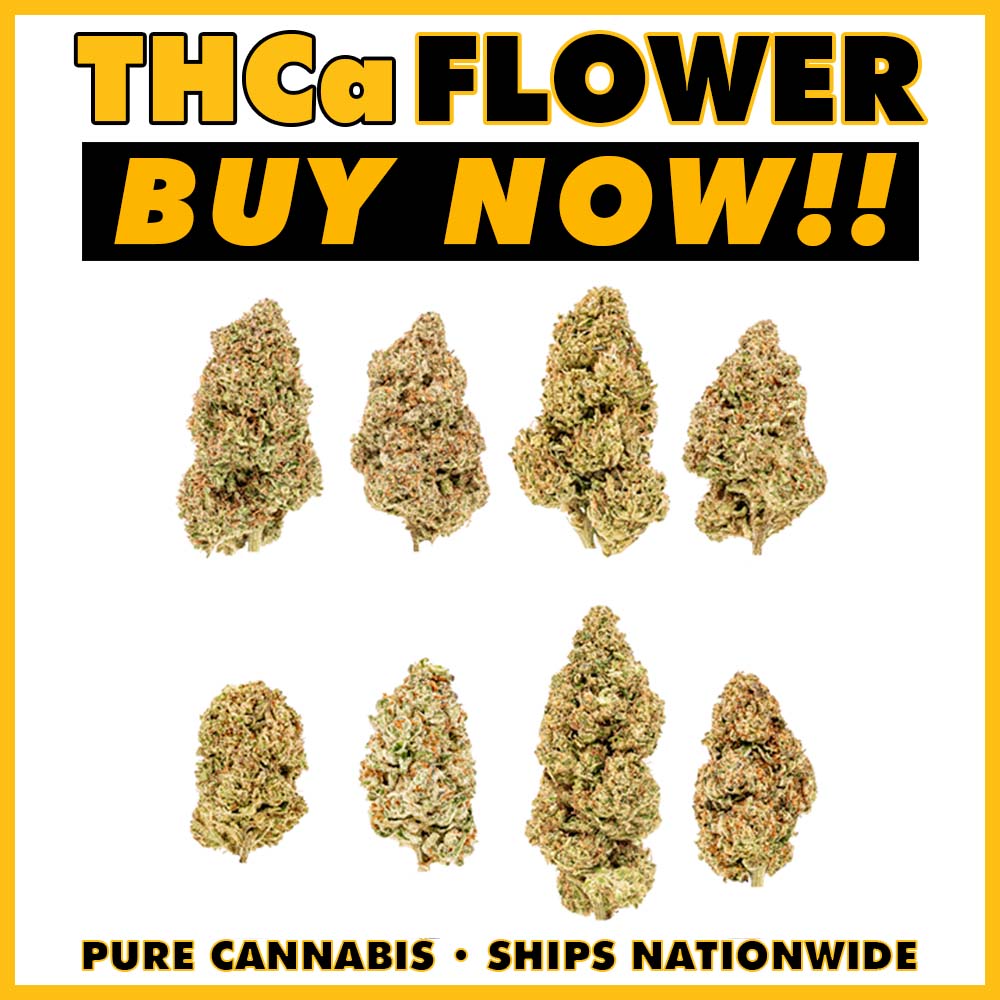THCa and State Compliance: Is it Legal in MY State?
If you’re confused about THCa and state compliance, you’re in an ever-expanding camp of curious cannabis lovers. The tempting cannabinoid now appears regularly on hemp dispensary shelves as if it’s Nature’s gift to humanity. And some say it comes pretty close to that!
But, the question many people have is: how could it be federally compliant if it has the potential to be as psychoactive as marijuana? And what about THCa and state compliance? Do state laws dictate whether or not you can use THCa?
We’ll tackle this question head-on and help you navigate the nuanced world of the THCa hemp flower.
What is THCa?
THCa (tetrahydrocannabinolic acid) is the precursor to THC (tetrahydrocannabinol), the primary psychoactive component of cannabis plants. When cannabis grows, it creates cannabinoids as carboxylic acids. These acidic cannabinoids change into non-acidic cannabinoids through a process called decarboxylation. Many cannabinoids begin in their acidic form and change after harvest. Delta-9 THC is the acidic outcome of THCa and has psychoactive effects, unlike its precursor.
Although abundant in fresh cannabis, THCa begins to change when it is exposed to light and heat. The moment it touches a heat source, it readily decarboxylates into THC. This aspect of THCa makes lab tests challenging to assess [1]. Does THCa get you high? It’s Complicated.
What is “THCa hemp flower?”
THCa hemp flower (or THCa flower) refers to cannabis buds marketed as hemp intended for smoking or vaping. These products contain high levels of THCa but low enough levels of Delta-9 THC to be federally compliant under the guidelines of the 2018 Farm Bill. With less than 0.3% Delta-9 THC, this cannabis is hemp.
One of the reasons THCa hemp flower has become such a hot item is that marijuana seekers can obtain THCa hemp flower without dealing with the dubious reputation of marijuana. Put simply, THCa flower is non-psychoactive. You do not get high when imbibing it because THCa does not bind to CB1 receptors in your endocannabinoid system. These receptors bind with THC, not THCa. But the moment you light up the THCa flower, it loses a carboxyl ring and binds with your CB1 receptors. Presto and you’re essentially smoking the next best thing [2].
At first glance, it seems like THCa flower allows you to reap the medicinal and recreational pleasures of marijuana without facing legal problems. But some plot twists complicate the story somewhat. To understand these, you need first to learn how the Farm Bills changed the legal status of cannabis in the United States.
Is THCa flower legal under federal law? THCa and state compliance
Thanks to the 2018 Farm Bills, THCa and THCa flower is federally legal in all states, A few states may for total THC content preharvest. Most states do not have the total THC mandate, which makes it easier to buy and sell THCa. The bill made all hemp derivatives federally compliant as long as they contain no more than 0.3 percent Delta-9 THC on a dry weight basis. Since THCa is chemically different from Delta-9 THC, it is allowed in higher concentrations under federal law, including in THCa flower [3].
Before a plant or product becomes federally compliant, it is tested to verify that it contains no more than 0.3 percent Delta-9 THC. THCa is not included in the post-harvest test except for a few states, which we’ll discuss below. Cannabis such as THCa flower is tested before decarboxylation can occur, which means that it can be sold legally if it maintains the lawful hemp concentration of 0.3 percent Delta-9 THC or less.
The Farm Bills and how they changed federal law
The “Farm Bill” refers to legislation passed when Congress considers new agricultural, conservation, and forestry policies every five years. These bills encompass policy areas that impact farmers, businesses, and consumers nationwide. Cannabis issues have been high on the priority list of legislators over the past decade. For example, in 2014, the legal status of cannabis changed dramatically. It expanded with the 2018 Farm Bill, making hemp’s legal status distinct from marijuana and igniting the beginnings of the cannabis industry as we now know it [4].
The 2014 Farm Bill
The 2014 Farm Bill enacted policy changes that initiated research into cannabis. More specifically, the bill differentiated hemp from marijuana, defining hemp as “the plant Cannabis sativa L. and any part of such plant, whether growing or not, with a Delta-9 tetrahydrocannabinol concentration of not more than 0.3% on a dry weight basis.” This legislation also established the Hemp Research Pilot Program to explore hemp applications for research purposes. Long-forbidden studies into cannabis began as scientists developed new theories about the potential medical applications of cannabis [5].
Are you a reseller? Wholesale THCa Flower: A Complete Buyer’s Guide
The 2018 Farm Bill
The 2018 Farm Bill was a significant turning point for the cannabis industry. In particular, the Agriculture Improvement Act of 2018 (another name for the 2018 Farm Bill) authorized hemp production and sales. In doing so, the Bill removed hemp and hemp seeds from the Drug Enforcement Administration’s (DEA) schedule of Controlled Substances.
Additionally, the Bill established the Domestic Hemp Production Program, which legalized industrial hemp. Appointing the USDA to evaluate and approve plans submitted by state legislatures and tribal authorities, the Bill established federal regulations for hemp growers, buyers, and sellers [5].
The bill helped to provide clarity about the definitions of hemp versus marijuana. It changed how people understood hemp, its potential benefits, and legal accessibility. It received bipartisan support and spurred widespread hemp cultivation and cannabis businesses. As a result of the bill, the hemp industry exploded as cannabis-derived compounds became mainstream.
Yet, the 2018 Farm Bill appears to have failed to anticipate the high THCa content of some fresh cannabis plants and how it can be easily turned into psychoactive THC via smoking, vaping, or cooking. Because of the Bill’s language, many enjoy taking advantage of the legal middle ground to enjoy federally compliant high THCa hemp flower.
Learn more in the Guide to THCa

THCa and state compliance
State laws can vary and change, so it’s important to know your state’s legal guidelines concerning THCa. That said, as long as THCa is derived from federally compliant hemp, it is Farm Bill complaint. Nonetheless, some states may attempt to limit access to THCa and may not be keen on those who partake. These states may consider the “total THC” concentration of a cannabis plant when testing for compliance.
As laws change, there may be little warning to consumers or businesses. Therefore, checking for the latest updates on your state’s hemp laws is essential before making a THCa purchase.
Navigating the Legal Landscape of THCa: Which States Allow THCa Concentrates?
How is THCa different from Delta-9 THC?
THCa is abundant in fresh hemp or marijuana plants, which are both types of cannabis. It is non-psychoactive in its pure form. However, it decarboxylates into psychoactive THC after exposure to heat and light. It’s important to understand that THCa can easily convert to Delta-9 THC when smoked, vaped, or cooked.
Thus, hemp farmers must closely monitor their crops’ Delta-9 THC and THCa levels near harvest time to understand the total THC potential of the plant before it is tested. Even in states that allow THCa hemp flower, many test for “total THC” levels before harvest [7].
Is it legal to smoke or vape THCa?
There are many ways to enjoy your THCa product and in most private places, you are free to do so. Even so, law enforcers may not fully understand the nuances of the laws. Depending on your situation, you may want to be discreet about your THCa smoking or vaping. For example, even states with medical marijuana laws that allow widespread use of high-THC marijuana for medical purposes may not wholeheartedly support THCa use for recreational use [3].
Many states that openly allow THCa also have strict drug testing guidelines to detect marijuana use amongst state employees. It may be legal to smoke THCa flower in your state, but some employers may not feel the same way about the cannabinoid. This may be especially the case if their business has particular workplace rules regarding cannabis or drug screenings.
THCa and state compliance: is it a controlled substance?
In terms of federal standards reflected in the 2018 Farm Bill, THCa is not considered a controlled substance unless it has higher than 0.3 percent Delta-9 THC. However, it may be considered a controlled substance in states that restrict THCa because of their possible “total THC” post-harvest testing requirements [8].
Benefits of THCa
It’s evident that THCa can provide users with a similar kinds of relief, euphoria, clarity, expansiveness and creative urges as Delta-9 THC. And since it’s federally compliant and from lawful hemp, there is a big advantage in being able to access high THCa flower easily – you can order THCa hemp flower online from Earthy Select. Preliminary studies have also shown that THCa has potential qualities that may help in treating or slowing diseases but more research is needed to substantiate these initial studies [9].
Final thoughts about THCa and state compliance
If you’re in a state that fully allows THCa and you enjoy the effects — whether for medical or recreational purposes—you’re in luck. You can buy THCa flower online! Decarboxylating your THCa flower is as simple as lighting a match. But tread carefully as you explore the world of THCa. Though you may be doing nothing wrong by smoking THCa flower, these laws are still new and can be misinterpreted, even by law enforcement. Not everyone has caught onto the secret rewards hidden beneath the surface of this remarkable cannabinoid.
Read next: Is Hemp-Derived Delta-9 THC Legal?
Medical Disclaimer / Legal Disclaimer – Information is provided for educational purposes. It does not and is not intended to constitute legal advice or medical advice. We attempt to be accurate and up-to-date, but the legality of cannabinoids and the science of cannabis are evolving. The author is neither a legal professional nor a medical expert. Before buying or using any products, you should check with your local authorities and medical providers.
-
- What is THCa?
- Demystifying the Differences Between THCa and THC
- THC Flower-The Next Big Thing in Hemp Land
- Cannabis and Hemp: Regulatory Green Light
- USDA Regulations and Lab Testing for Hemp
- THCa-Where is IT Legal?
- Domestic Hemp Production Program
- State Industrial Hemp Statutes
- THCa and Anti-inflammatory Activity
Frequently Asked Questions
What is a THCa flower COA?
COA stands for certificate of analysis. It’s simply a lab report detailing extensive breakdowns of what cannabinoids are in a product.
Do DEA agents test for THCa when determining if a plant is hemp or marijuana?
The DEA tests for Delta-9 THC when determining if a cannabis plant is federally compliant.
How do I know if THCa flower is legal in my state?
THCa flower is federally lawful under the Farm Bill. As state laws are subject to change at any time, it is wise to know the laws in your state regarding THCa. Check your state websites and publications. Consulting a lawyer is also a good practice.



